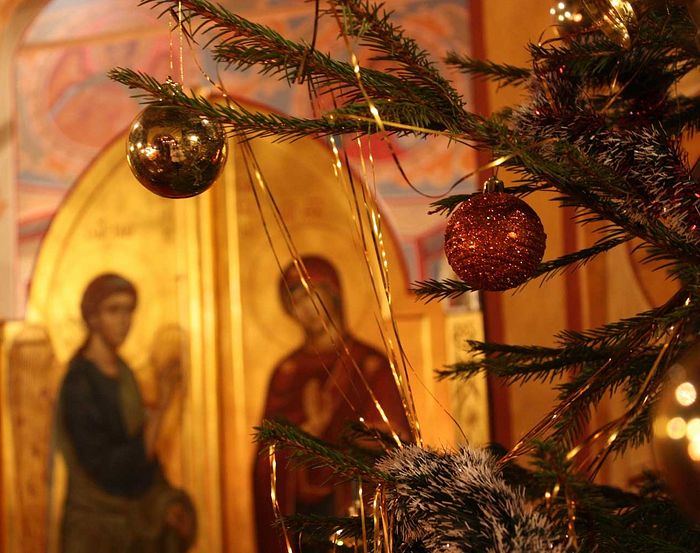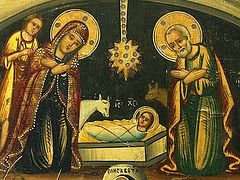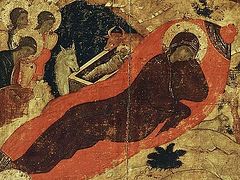“People, let us pre-feast the Nativity of Christ.”
This is the time of the Advent of the Nativity of Christ, a time of fasting and preparation for the great feast.
Usually the Nativity of Christ is a special day, a special time of year, when we forget God. Or, it would be better to say, we experience Christmas commercially: the illuminated city streets, the illusory light of garlands, fake Christmas trees, treats, “kurabye and melomakarona” (traditional Christmas sweets in Greece, a symbol of the Christmas table.—Trans.) the exchange of gifts, the foretaste of days off work, extra pay… And Christmas ends—with a full stomach and an empty heart. Christ is nowhere to be found. This all has almost no relation to truth and greatly disappoints; the holiday has become a provocation, it has fallen into commercialism. And probably we could find some justification for some of those who exploit Christmas in their attempts to earn their daily bread, but this need of theirs destroys the wondrous meaning and depth of the feast.
The deception of “commercial” Christmas is the first deception. But there is also another one, which is more insidious. This is the deception of “social” Christmas: We perceive Christmas as a “festival of love, a family holiday”. It is a holiday when we all meet and donate money to social projects, or gather and distribute packages for the poor containing rice–macaroni–potatoes–a bottle of oil–chicken. This is all good; therefore the Church also welcomes it, and we should do it too. But good deeds before Christmas do not equal Christmas itself. We can give some charity, buy something at the Christmas charity bazaar, put some money in the basket, and perhaps go and help distribute gifts at the diocese to poor families, and at the same time not experience the Nativity in our lives.
Then just what is the Nativity? How should we greet it? Perhaps we need to do something even more essential this year, which for some of us—very probably for me—will provide the last such opportunity? What is the meaning of Christmas?
When we say, “Christmas”, or “the feast of the Nativity,” in our mind these concepts are, as a rule, connected with the abundance of all possible blessings, the exchange of gifts, decorations, travel, finally… These concepts only underscore the error formed in us. However, on the other hand, they give us a reason to change a little. Let’s try to trade abundance—at least this year—for simplicity, and to live the coming Christmas in that simplicity. Not in poverty, like Christ, but without extravagance. Let our table be filled enough to satisfy our needs, but not over-laden with foods. Instead of us, the satiated, giving gifts to the satiated, let’s try to work some mercy in our souls and deprive ourselves of something for our neighbor’s sake. If we have no money, let’s give a little of our time to the suffering, a little patience to the lonely person with a difficult personality; let’s labor for the sake of those who need it, let’s visit the hospital. And this will be the best gift to Christ. Instead of decorating everything around us, let us adorn our souls. It will be unfortunate if our homes are decorated all around with pine trees and flowers, but our heart is covered with cobwebs. And how beautiful it is when the heart is adorned, while the house is festively decorated, but modestly!
Instead of long trips let’s take only one—the voyage of the magi and shepherds: Let us now go even unto Bethlehem, and see this thing which is come to pass, which the Lord hath made known unto us (Lk. 2:15). In order to understand what Bethlehem is, we will need a little quietude. Is this an event that happened once upon a time in one Palestinian village? Or is it a state that I too am able to perceive, being like unto the Magi in humility? Does an understanding of the Nativity come a little nearer? What does it tell us? How our salvation is born in the simplicity of a cave and the humbleness of swaddling clothes? How God exudes His love and clothes Himself in human nature? How God comes down and grants us the most magnificent possibility to become like Him?
The Advent fast is a blessed time, which is again revealed before us. It is revealed like a unique opportunity for each of us. These forty days of Advent continually remind us of this, and all our lives. We have only to open our eyes and ears and receive the spiritual tidings, in order to be able to find ourselves in the authentic Bethlehem, and rejoice in the Nativity with all our being. Then the coming Nativity will confirm that “God is with us”, and not only “with us,” but also in us: The Kingdom of God is within you (Lk. 17:21).
I wish that God would grant you all without exception at the end of these forty days to be worthy to see Christ, not only born in the manger at Bethlehem, but most importantly, lying in the manger of your souls.





